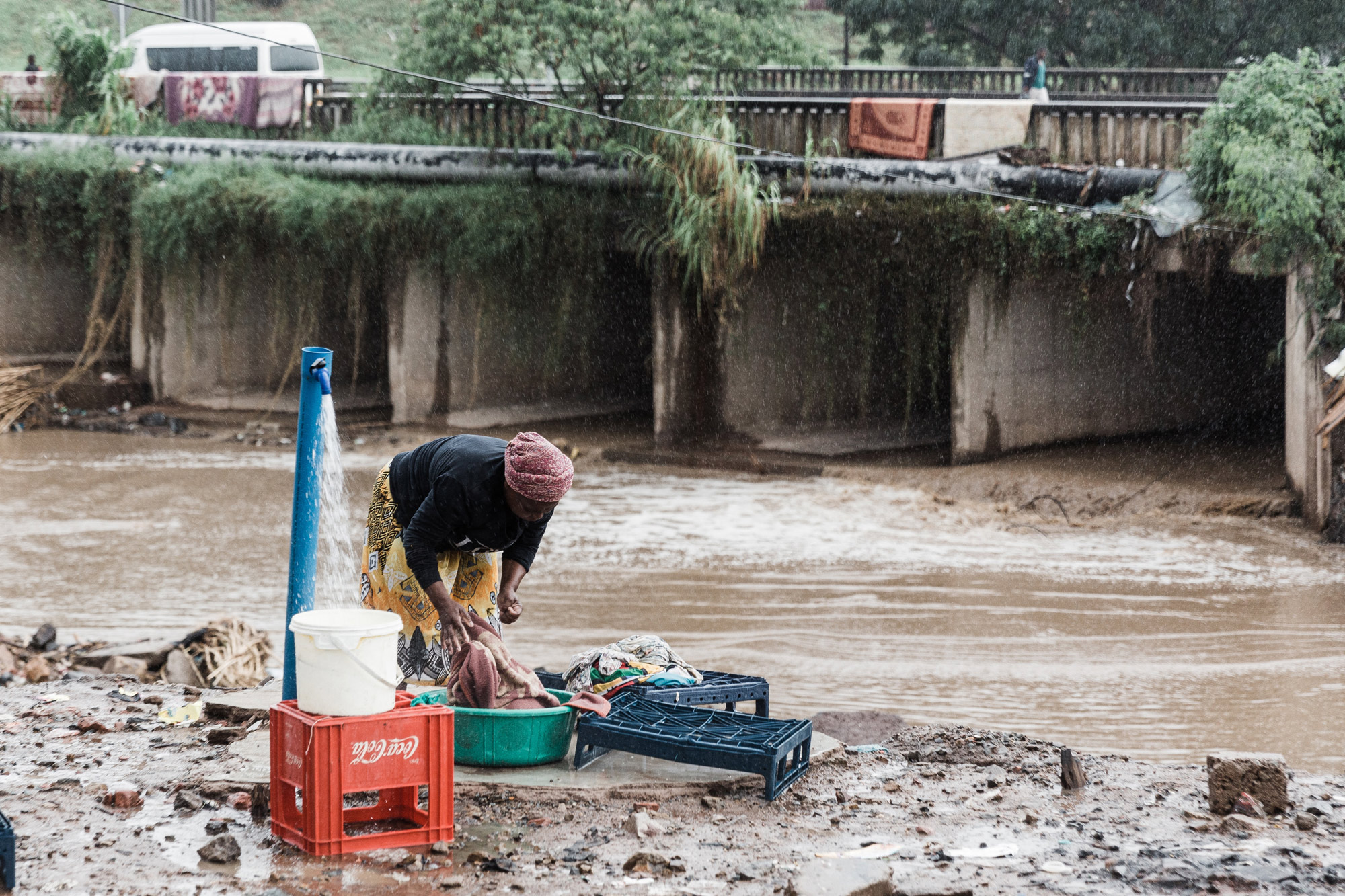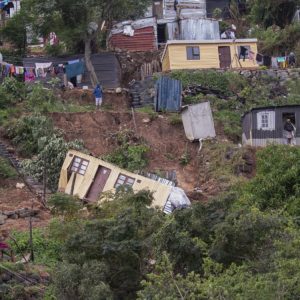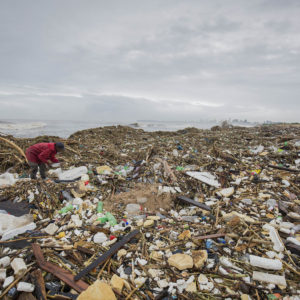Rebuilding Durban will require the state and society
The ANC’s repeated failures to manage public money with integrity and social purpose are not the only cause for concern as relief efforts get under way in Durban.
Author:
22 April 2022

In less than a year, the wheel of history has turned twice in Durban. The riots in July 2021 showed both that popular consent for a massively exclusionary social system is far from guaranteed, and that powerful protagonists in the violently kleptocratic current in the ANC were willing to mount a direct and violent attack on the limited form of democracy achieved in 1994.
The floods have not just shown the social cost of the ANC’s failures to achieve urban land reform, to build and maintain the infrastructure required for a viable urban life, and to run systems such as waste management with a focus on the collective good rather than mafia-style private accumulation. As many commentators have noted, the floods have also shown how completely the moral authority of the ANC has collapsed. From the gated communities in uMhlanga to the city’s vast shantytowns there is a deeply held and widespread view, frequently expressed in terms of visceral revulsion, that the ANC cannot be trusted to manage the billions of rands that will be required to begin to rebuild all that has been lost.
In this case the ANC in Durban, though being unashamedly corrupt and also more violent than anywhere else in the country, is not solely to blame. The looting during the Covid pandemic was a national phenomenon. Its staggering scale and utter cynicism have irreparably damaged the standing of the party across South Africa.
Related article:
As happened in the aftermath of the riots, it is neighbourhood associations, churches, temples and mosques, and larger organisations such as Gift of the Givers and Abahlali baseMjondolo, that are understood to be nodes of integrity in a landscape of moral devastation.
It is not impossible that this turn away from the state could incubate more community-centred and controlled modes of politics. There were numerous experiments in electoral politics around the country last year in the form of local actors with standing – activists, schoolteachers and the like – running as independent candidates.
But it has mostly been forms of right-wing populism, invariably xenophobic to the core, that have been the beneficiaries of the collapse in the ANC’s moral authority. Without a mode of connecting local experiments in community-based alternatives with each other, or the emergence of a Left party with a national reach, it will be the Right that surges into greater prominence and power as people turn, revolted, from the stench of what the ANC has become.
Reclaiming the state
But these are questions for the future. Right now homes, roads and bridges must be rebuilt, people fed, clothed and housed, safer land found for people who were living on riverbanks, and drainage and waste collection systems fixed. Some of this, such as providing food and clothes to people who have lost everything, can probably be better achieved by organisations outside of the state. Gift of the Givers certainly has the integrity and logistical capacity to be far more effective than the state in terms of providing people with immediate support.
But it is only the state that can, at this moment, move to fix roads and bridges, clear drains, pursue an urgent project of urban land reform – or support and give legal sanction to grassroots urban planning, repair houses at scale and develop proper waste management systems. There has to be a way to make the state work. It may have largely abandoned the people, but the people cannot abandon it. On the contrary, the state must be subordinated to society.
Related article:
This is not just a matter of preventing wholesale theft, it is also about ensuring that the social support the state does provide is allocated on the basis of need rather than through systems of patronage aimed at rewarding support for the ANC. For well over 20 years all kinds of state support, from food parcels to government houses, have regularly been allocated on the basis of support for the party. A notable exception is social grants, which do not pass through the hands of ward councillors before reaching people. Councillors have tried to manipulate access to grants by, for example, withholding proof of address certification from people who are critical of their authority or organised outside of it. But these efforts have had limited success and the grants are, to a significant extent, a universal entitlement for qualifying citizens.
There is an important lesson here, one that Cyril Ramaphosa appears to have understood given the talk of an “independent agency” managing relief efforts. In this moment of crisis, it is imperative that the systemically corrupt and often violent people who have largely captured local government in Durban and the smaller towns up and down the coast are kept away from the money that will have to follow the waters.
Exploiting disaster
There is also a third imperative. In her 2007 book, The Shock Doctrine: The Rise of Disaster Capitalism, Naomi Klein shows that states and capital often exploit disasters to reorganise society in their own interests. Her work was fundamentally shaped by Hurricane Katrina, which devastated New Orleans in 2005. Writing in 2017, Klein recalled that she watched “hordes of private military contractors descend on the flooded city to find ways to profit from the disaster, even as thousands of the city’s residents, abandoned by their government, were treated like dangerous criminals just for trying to survive”.
The section on South Africa in Klein’s book is flawed, but her general argument about disaster as an opportunity for elites to reorganise has a clear and powerful, although not directly intended, resonance with how disasters such as shack fires are exploited by elites in this country.
Shack fires have not just been an opportunity for political elites to profit from money allocated to relief efforts. They have also been an opportunity for local councillors and ward and party committees to allocate that relief to their supporters while excluding critics and independently organised people. This can go so far as preventing people from rebuilding. Fires are also routinely used to prevent migrants from rebuilding. There have been times when the use of a fire to prevent some from rebuilding has also taken on ethnic dimensions.
Shack fires in Durban have been used to move people from well-located land – close to livelihoods and schools – to the urban periphery, to what people often refer to as “the human dumping grounds”. For many people already living profoundly precarious lives, forced removal out of the city has had devastating consequences, including loss of income and children having to give up their schooling.

Shack fires have also been exploited to move people from self-built shacks managed outside of the authority of the state – for better or worse – into government-built and managed shacks. Termed “transit camps” and said to be short-term interventions, they invariably become permanent forms of accommodation. These camps are usually managed by local political elites who, as well as seeing them as opportunities for accumulation and patronage, are able to exert direct forms of political control, with the threat of expulsion a central weapon. Transit camps – known as amatins by their residents – are not only wholly inadequate and undignified forms of accommodation, they also mark a major decline in personal and collective autonomy.
Large numbers of people have lost their homes in the floods. They need to be rehoused and some need to be rehoused in new locations. It is crucial that this process is not misused to exclude migrants and other minorities from access to land and housing. It is also crucial that it is not misused to remove people from the city or place them in transit camps.
What is required now are swift forms of state intervention that circumvent local political elites, undertake a rapid process of urban land reform to secure well-located and safe land for displaced people, use democratic forms of planning and, within the limits of geographic and other material constraints, adhere to the principle of the Freedom Charter that “all people shall have the right to live where they choose”.


